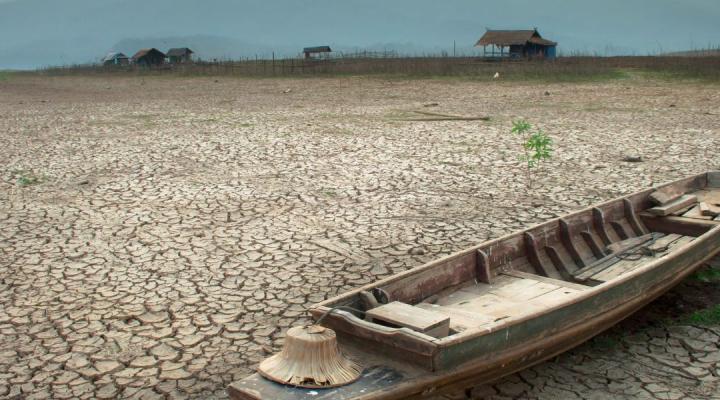By Lynn Kirkpatrick, CEO of Ensysce Biosciences – a clinical-stage biopharmaceutical company developing safer prescription drugs to treat severe pain. Lynn is a judge on the Burjeel Holdings Oxford Saïd Climate Change Challenge and has provided this blog for Oxford Answers.
The clock is ticking, and the stakes couldn’t be higher. Climate change is a daunting global challenge that knows no boundaries and respects no borders. It demands innovative solutions that transcend the conventional and the mundane. One step to a solution is to harness biotechnology to aid in combating climate change.

The potential of biotechnology, where many of today’s new technologies and products first get off the ground, to address this colossal issue is nothing short of extraordinary, touching upon five critical aspects – those same five areas which formed the basis for the Burjeel Holdings Oxford Saïd Climate Change Challenge:
- air pollution
- extreme weather events
- diseases carried by insects
- food security
- water scarcity

Air pollution
Air pollution poses a dire threat to the health of our planet. The consequences, such as smog-filled skies and respiratory illnesses, are glaringly evident. Biotechnology steps in with a solution that's as ingenious as it is effective. Engineered microorganisms can be deployed to scrub the atmosphere of harmful pollutants like nitrogen oxides and volatile organic compounds, effectively reducing air pollution. Moreover, the production of biofuels from algae, fungi, and bacteria can substantially diminish emissions of greenhouse gases, curbing our carbon footprint.
Extreme weather events
The intensification of extreme weather events is a clear signal of climate change. Biotechnology has a role to play here as well. Through genetic engineering, we can bolster the resilience of crops to withstand harsh climatic conditions. This leads to increased agricultural productivity, which is crucial for a growing global population in the face of changing weather patterns. These genetically modified crops, coupled with precision agriculture techniques, empower us to adapt and mitigate the impact of extreme weather events on food production.
Diseases carried by insects
Climate change contributes to the spread of diseases carried by insects, such as malaria and dengue fever. Biotechnology offers a beacon of hope with the genetic modification of insects themselves. Techniques like gene drives can reduce the population of disease-carrying insects, acting as a preventive measure against the proliferation of these illnesses. Moreover, advancements in biotechnology enable the development of vaccines and treatments for the diseases themselves that are both more effective and affordable, such as a newly announced RNA vaccine combating malaria.
Food security
With a rising global population and an ever-shrinking area of arable land, food security is a pressing concern. Biotechnology answers this challenge through the development of drought-resistant and pest-resistant crops. By enhancing crop yields, biotechnology can help meet the food demands of the future. Additionally, alternative food sources like lab-grown meat and plant-based proteins are revolutionising the food industry, offering sustainable options that require fewer resources and produce lower emissions.

Water scarcity
Water scarcity looms large on the horizon. The biotechnology sector contributes through innovative methods of wastewater treatment and desalination, rendering water resources more accessible and reducing the environmental impact of water-intensive processes. Moreover, genetically modified plants can aid in phytoremediation, absorbing pollutants from the soil and groundwater, leading to cleaner water sources.
In the grand tapestry of the battle against climate change, biotechnology emerges as a versatile thread, interwoven with innovative solutions to some of the most pressing issues of our time. As we stand on the precipice of a climate catastrophe, embracing these biotechnological advancements is not just a choice; it's an imperative. It's a testament to human ingenuity, driven by our commitment to secure a sustainable future for upcoming generations. With each scientific breakthrough, we inch closer to a world where climate change may no longer be a looming threat but still presents a formidable challenge. Biotechnology is our key to not just adapt to change but to be the change, ensuring a healthier, more sustainable world for generations to come.
Let us seize this opportunity to shape our destiny and curtail climate change through the remarkable potential of biotechnology. Together, we can alter the course of our future, fortifying our planet against the ravages of a changing climate.
It was with this in mind that the Climate Change Challenge a global competition announced by Burjeel Holdings and Saïd Business School was launched in the summer of 2023 to empower the upcoming generation of high school students (aged 15 to 18) and their educators across the world that to contribute ideas and take action towards creating solutions to the greatest and most complex threat to humanity: the climate crisis.
Many thanks to Lynn and the rest of the panel of international judges who gave their time and expertise to review entries for our Climate Change Challenge. The winners were announced at COP28, the UN Climate Conference, in Dubai on 2 December.




